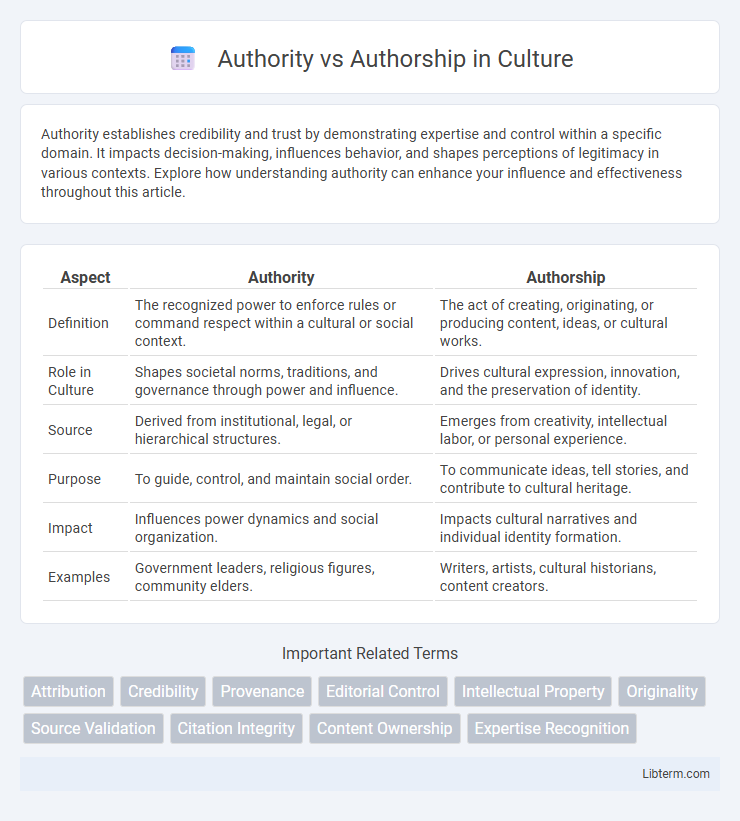Authority establishes credibility and trust by demonstrating expertise and control within a specific domain. It impacts decision-making, influences behavior, and shapes perceptions of legitimacy in various contexts. Explore how understanding authority can enhance your influence and effectiveness throughout this article.
Table of Comparison
| Aspect | Authority | Authorship |
|---|---|---|
| Definition | The recognized power to enforce rules or command respect within a cultural or social context. | The act of creating, originating, or producing content, ideas, or cultural works. |
| Role in Culture | Shapes societal norms, traditions, and governance through power and influence. | Drives cultural expression, innovation, and the preservation of identity. |
| Source | Derived from institutional, legal, or hierarchical structures. | Emerges from creativity, intellectual labor, or personal experience. |
| Purpose | To guide, control, and maintain social order. | To communicate ideas, tell stories, and contribute to cultural heritage. |
| Impact | Influences power dynamics and social organization. | Impacts cultural narratives and individual identity formation. |
| Examples | Government leaders, religious figures, community elders. | Writers, artists, cultural historians, content creators. |
Understanding Authority and Authorship
Authority reflects recognized expertise and trustworthiness in a specific domain, often validated through credentials, experience, and reputable endorsements. Authorship emphasizes the origination and creation of content, highlighting the source responsible for producing information or work. Understanding both concepts is crucial for evaluating the credibility and provenance of content across academic, legal, and digital contexts.
Defining Authority in Content Creation
Authority in content creation is defined by the creator's expertise, credibility, and trustworthiness within a specific niche or industry. Search engines and audiences value authoritative content that demonstrates in-depth knowledge, accurate information, and reliable sources. Establishing authority involves consistent quality publishing, expert credentials, and strong user engagement signals that validate the content's reliability.
Exploring the Concept of Authorship
Exploring the concept of authorship involves examining the origin, ownership, and creative control of a work, emphasizing the intellectual contribution of the author. Authorship assigns accountability and recognition for original ideas, shaping cultural and legal frameworks in copyright law and academic integrity. Understanding authorship helps delineate the boundaries between creator rights and authority, impacting content authenticity and provenance.
Key Differences: Authority vs Authorship
Authority refers to the recognized power or influence a person or entity holds within a particular domain, often validated by expertise, credentials, or official position. Authorship specifically denotes the act of creating original content, such as writing a book or article, and establishing intellectual ownership over that work. Key differences include that authority implies credibility and control beyond creation, while authorship centers solely on the origination and ownership of intellectual material.
The Role of Expertise in Establishing Authority
Expertise plays a crucial role in establishing authority by demonstrating deep knowledge and experience within a specific field, thereby enhancing credibility and trustworthiness. Authors with verified qualifications, professional backgrounds, and a history of accurate, well-researched content significantly influence the perceived authority of their work. Search engines and audiences prioritize content from experts, making the role of expertise fundamental in differentiating authoritative authorship from general content creation.
Credibility Through Authorship
Credibility through authorship is established by demonstrating expertise, experience, and a strong publication record in a specific field, which enhances the perceived authority of the content. Search engines prioritize content created by recognized authors with verifiable credentials, boosting rankings and trustworthiness. Clear author attribution combined with well-referenced, accurate information reinforces authority and provides a reliable user experience.
Authority Signals in Modern Digital Media
Authority in modern digital media is established through verified credentials, backlinks from reputable websites, and consistent high-quality content relevant to the niche. Authority signals such as domain age, SSL certificates, and social proof via user engagement metrics enhance trustworthiness and search engine rankings. These factors collectively influence perceived expertise and credibility more than mere authorship, shaping digital influence and audience trust.
Authenticity and Voice: The Author’s Perspective
Authority in writing establishes credibility through expertise and trustworthiness, while authorship emphasizes genuine expression and unique voice. Authenticity in the author's perspective ensures the message resonates deeply, reflecting personal insights and values that create a distinctive narrative. This balance between authority and authorship enhances the impact and reliability of the content, fostering a stronger connection with readers.
SEO Implications: Authority vs Authorship
Authority in SEO refers to the overall trustworthiness and credibility of a website, which is influenced by factors such as backlinks, domain age, and content quality. Authorship, on the other hand, centers on the recognized expertise of content creators, enhancing search engines' ability to attribute trust and relevance to specific authors. Leveraging both authority and authorship strategically improves search rankings by signaling to algorithms that content is both credible and authored by experts in the field.
Building Trust: Balancing Authority and Authorship
Building trust requires a strategic balance between authority and authorship, emphasizing credible expertise while fostering genuine, personal engagement. Authority establishes reliability through verified knowledge, whereas authorship enhances authenticity by connecting with audiences on a relatable level. Effective trust-building leverages authoritative content backed by experience and transparent authorship to create a loyal and trusting audience.
Authority Infographic

 libterm.com
libterm.com